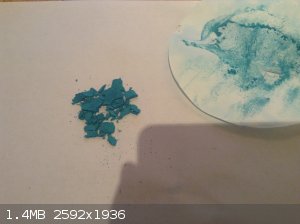Smooth203
Harmless

Posts: 21
Registered: 29-10-2016
Location: Lancaster - UK
Member Is Offline
Mood: No Mood
|
|
Electrolysis with NaHCO3
I was trying to electrolyse water with Sodium Bicarbonate added to get a copper compou8nd of some sort and I did, as the water turned blue then a
light blue precipitate formed, I think it's either copper hydroxide or copper carbonate or something similar but nI'm just not sure, so I was
wondering if anyone has some knowledge on this? If you need more details, just ask 
|
|
|
Metacelsus
International Hazard
    
Posts: 2531
Registered: 26-12-2012
Location: Boston, MA
Member Is Offline
Mood: Double, double, toil and trouble
|
|
I assume you used a copper anode. What you have is probably basic copper carbonate (Cu2(OH)2CO3). Posting a picture
would be helpful.
|
|
|
Smooth203
Harmless

Posts: 21
Registered: 29-10-2016
Location: Lancaster - UK
Member Is Offline
Mood: No Mood
|
|
Quote: Originally posted by Metacelsus  | | I assume you used a copper anode. What you have is probably basic copper carbonate (Cu2(OH)2CO3). Posting a picture
would be helpful. |
It's still a little bit clumpy as it didn't dry very well last night, and I've not tried to powderised it yet. And yes, both of my electrodes were
copper.

[Edited on 23-11-2016 by Smooth203]
|
|
|
ave369
Eastern European Lady of Mad Science
   
Posts: 596
Registered: 8-7-2015
Location: No Location
Member Is Offline
Mood: No Mood
|
|
Try to drip some acid on this powder. If it fizzes, it's basic copper carbonate.
Smells like ammonia....
|
|
|
Smooth203
Harmless

Posts: 21
Registered: 29-10-2016
Location: Lancaster - UK
Member Is Offline
Mood: No Mood
|
|
Alright, ill give it a go later, not at home right now but I'll post it on here
|
|
|
Smooth203
Harmless

Posts: 21
Registered: 29-10-2016
Location: Lancaster - UK
Member Is Offline
Mood: No Mood
|
|
I put some acid on it and it did indeed fizz, I can't beleive I forgot I could just test it like that  Thanks for all your help anyway guys Thanks for all your help anyway guys
|
|
|
Metacelsus
International Hazard
    
Posts: 2531
Registered: 26-12-2012
Location: Boston, MA
Member Is Offline
Mood: Double, double, toil and trouble
|
|
It's likely you have the basic copper carbonate, but one potential issue is that the fizzing could have come from residual sodium bicarbonate. Did you
wash the precipitate with water before the test?
|
|
|
Smooth203
Harmless

Posts: 21
Registered: 29-10-2016
Location: Lancaster - UK
Member Is Offline
Mood: No Mood
|
|
Quote: Originally posted by Metacelsus  | | It's likely you have the basic copper carbonate, but one potential issue is that the fizzing could have come from residual sodium bicarbonate. Did you
wash the precipitate with water before the test? |
No I didn't, as I obviously need to start thinking things through more. I'll give it a washing and try again later 
|
|
|
AJKOER
Radically Dubious
    
Posts: 3026
Registered: 7-5-2011
Member Is Offline
Mood: No Mood
|
|
As a half cell reaction may form OH- it is possible, in my opinion, in the vicinity of the electrode producing the hydroxyl ion that a deeper blue
color may appear. This is associated with the possible additonal formation of a small amount of Na2[Cu(OH)2(H2O)2], sodium tetrahydroxocuprate(II).
Here is a reference, to quote from Doctor Brown's chemistry website (link: http://www.docbrown.info/page07/transition09Cu.htm ):
"When alkaline aqueous ammonia or sodium hydroxide is added to a blue hexa–aqua copper(II) ion solution, initially a gelatinous palish blue
precipitate of the hydroxide is formed.
Note it can be 4 or 6 H2O in the complex ion Cu2+(aq) i.e. [Cu(H2O)4]2+(aq) ... or ...
[Cu(H2O)6]2+(aq) + 2OH–(aq) ==> [Cu(H2O)4(OH)2](s) + 2H2O(l)
The equation could also be written to show the formation of [Cu(H2O)4(OH)2](s)
or more simply: Cu2+(aq) + 2OH–(aq) ==> Cu(OH)2(s)
A precipitation reaction involving ligand displacement has occurred.
When you add quite concentrated sodium hydroxide (or potassium hydroxide) solution to the blue gelatinous copper(II) hydroxide precipitate the blue
colour deepens, so something is happening!
This change in colour suggest some ligand changes have taken place.
In fact a very small amount of the tetrahydroxocuprate(II) complex anion is formed, i.e. a tiny amount of the hydroxide precipitate dissolves, but
overall copper(II) hydroxide is effectively insoluble even in strongly alkaline solutions.
This is why most textbooks will say the copper(II) hydroxide precipitate is insoluble in excess alkali.
The formation of a small amount of the soluble deeper blue complex anion can be expressed as ...
Cu(OH)2(s) + 2OH–(aq) ==> [Cu(OH)2(H2O)2]2–(aq)
or more correctly ... since it is a ligand displacement reaction
[Cu(H2O)4(OH)2](s) + 2OH–(aq) ==> [Cu(OH)2(H2O)2]2–(aq) + 2H2O(l)
This lack significant amphoteric character means copper(II) oxide is essentially a basic oxide (insoluble in water) that readily dissolves in acids to
form soluble copper(II) salts ..."
|
|
|
MrHomeScientist
International Hazard
    
Posts: 1806
Registered: 24-10-2010
Location: Flerovium
Member Is Offline
Mood: No Mood
|
|
Rinse the blue precipitate thoroughly with distilled water to eliminate residual bicarbonate, then test again. It's almost certainly basic copper
carbonate, but this is good lab practice and you need to eliminate uncertainties like this when performing experiments. Let us know how it turns out!
|
|
|